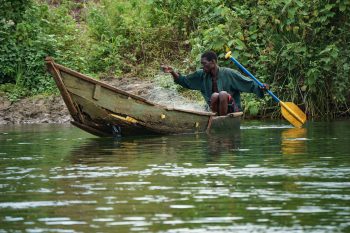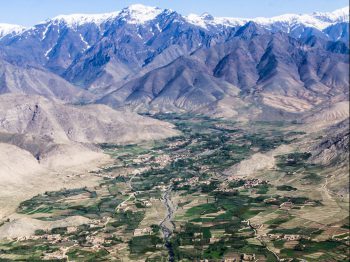Encouraging science-based policymaking in East Africa
Water scarcity intensifies when demand increases and availability in terms of quantity and/or quality decreases. The IIASA Water Futures and Solutions Initiative (WFaS) identifies and tests solution pathways across different economic sectors and supports the co-design of future development scenarios and possible solution options through stakeholder engagement. This provides important input for supporting mid- to long-term water management and planning based on informed decision making.
The initiative focused on East Africa with the extended Lake Victoria Basin as a key research area, aiming to understand the future water balance in the region toward 2050. The team used an integrated modeling framework combining the IIASA Community Water Model and the Extended Continental-scale Hydroeconomic Optimization model (ECHO), under two future development scenarios. Based on the East Africa Vision 2050 and the development visions of the East Africa Community member countries, the team developed an East Africa Regional Vision Scenario, while the second scenario, Business As Usual, is based on the Shared Socioeconomic Pathways (SSP2).

Figure 1: Change of the Water Exploitation Index for the Lake Victoria Basin from 2010 to 2050. The panels indicate how total water abstraction puts pressure on water resources. Severe water stress can occur in regions with an index over 40%.
Rapid economic development and population growth expected up to 2050 will lead to a sharp increase in water demand across all economic sectors. In this particular study area, much of the demand is expected to be offset by an increase in water availability due to climate change effects like increased precipitation, along with surface water runoff due to land use changes. According to the researchers, this may still lead to major water imbalances at the local scale and in particular areas of the studied basin.
The results of the two scenarios show moderate water scarcity when measured using the Water Exploitation Index (Figure 1) and high water scarcity when measured using the Water Crowding Index (Figure 2). Uncertainties in the modeling results are mainly attributed to the projection of various drivers such as irrigation area expansion, future water use efficiency parameters, and climate change effects resulting from the use of general circulation models.
The project is funded by the Austrian Development Agency (ADA) and the Austrian Federal Ministry of Sustainability and Tourism. The results are helping the Lake Victoria Basin Commission and its member states (Burundi, Kenya, Rwanda, South Sudan, Tanzania, and Uganda) to make science based water resource management decisions. Stakeholder workshops presented as part of the project attracted researchers and practitioners from across the region [1]. In December 2018, the results were also presented and discussed at a workshop that included training participants on the analysis and interpretation of the modeling results [2].

Figure 2: Change of the Water Crowding Index for the extended Lake Victoria Basin from 2010 to 2050. Below 1,700m³/capita/year water stress appears regularly, below 1,000 water scarcity is a limitation to economic development and human health, and below 500 water availability is a main constraint to life.
The team will expand their work through a project titled, Scaling out Resilient Water and Agricultural Systems (scaleWAYS), which looks at up-scaling options for water and land management practices for the resilient and sustainable intensification of agricultural production and food systems in the extended Lake Victoria Basin [3].
References
[1] Burtscher R, Langan S, Tramberend S, & Burek P (2018). Solutions for a water secure East Africa in 2050 Workshop on mid- to long-term water resources management and planning in Eastern Africa December 4-6, 2017 Entebbe, Uganda. IIASA Report. Laxenburg, Austria: IIASA
[2] Burtscher R, Langan S , Tramberend S, & Burek P (2019). East Africa Future Water Scenarios to 2050 Consultation and Joint Learning Workshop December 4-6, 2018 Entebbe, Uganda. IIASA Research Report. Laxenburg, Austria: RR-19-002
[3] Tramberend S, Burtscher R, Burek P, Kahil T, Fischer G, Mochizuki J, Wada Y, Kimwaga R, et al. (2019). East Africa Water Scenarios to 2050. IIASA Working Paper. Laxenburg, Austria
Further information
- Lake Victoria Basin Commission (LVBC), Kenya
- Ministry of Water and Environment of Uganda, Uganda
- Nile Basin Initiative Secretariat and the Nile Equatorial Lakes Subsidiary Action Program
- Global Water Partnership Eastern Africa, Uganda
- Makerere University, Uganda
- University of Dar es Salaam, Tanzania
- Egerton University, Kenya
- Rongo University, Kenya
- University of Burundi, Burundi
- University of Rwanda, Rwanda
- Integrated Polytechnic Regional College (IPRC) of Kigali, Rwanda
- Institute of Rural Development Planning (IRDP), Tanzania
Related research





